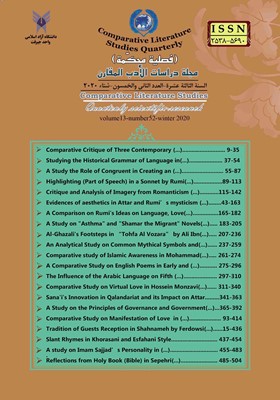Slant Rhymes in Khorasani and Esfahani Style
Subject Areas : شعرFatemeh Haji Aghabozorgi 1 , Abbasali Vafaei 2 , Reza Fahimi 3
1 - PhD Candidate, Faculty of Persian Language & Literature, Islamic Azad University, Saveh Branch
2 - Professor, Faculty of Persian Language & Literature, Islamic Azad University, Saveh Branch
3 - Assistant Professor, Faculty of Persian Language & Literature, Islamic Azad University, Saveh Branch
Keywords: ترادف, ترکیب, سبک, تضاد, style, تناسب, Opposition, proportion, synonym, اتباع, اسم مهمل, slant rhymes, nonsensical noun,
Abstract :
Slant rhymes are widely applied both in poetry and prose as well as in conversational language. The time of applying the mentioned compositions in written or oral works by Iranians is not clear yet. Studies in ancient texts only provide some samples of these combinations in deceased texts. According to slant rhymes' procedure in different periods and their applications in the language of poets and writers of different styles, it can be claimed that initial slant rhymes are different from its current form which is also called "nonsensical noun". With the exception of some combinations that have been meaningless or careless from the beginning where the word function is completely meaningless from Rudaki's viewpoint and he has applied it only once. In this research the works of famous poets and writers of Khorasan and Esfahani periods have been studied in order to achieve the process of employing slant rhymes. The findings support application of "nonsensical noun" or slant rhyme in order to make brevity in speech.
انوری، حسن و حسن گیوی. 1370ش، دستور زبان، چاپ نهم، تهران: انتشارات فاطمی.
باباطاهر. بی تا، رباعیات، چاپ دوم، تهران: نشر محمد.
بیهقی، ابوالفضل. 1370ش، تاریخ بیهقی، چاپ چهارم، تهران: انتشارات خواجو.
تبریزی، صائب. 1373ش، دیوان، چاپ اول، تهران: انتشارات مستوفی.
ذاکری، مصطفی. 1381ش، اتباع و مهملات در زبان فارسی، چاپ اول، تهران: مرکز نشر دانشگاهی.
سعد سلمان، مسعود. 1374ش، دیوان، چاپ اول، تهران: انتشارات نگاه.
سیستانی، فرخی. 1377ش، گزینه سخن پارسی، چاپ نوزدهم، تهران: انتشارات صفی علیشاه.
قابوس بن وشمگیر، عنصر المعالی. 1366ش، قابوسنامه، چاپ چهارم، تهران: شرکت انتشارات علمی و فرهنگی.
قبادیانی، ناصرخسرو. 1370ش، دیوان، چاپ چهارم، تهران: انتشارات دانشگاه تهران.
کزازی، میرجلالالدین. 1386ش، نامه باستان، چاپ ششم، تهران: انتشارات سمت.
مشیری، مهشید. 1379ش، فرهنگ اَتباع و اَتباع سازی، چاپ اول، تهران: انتشارات آگاهان دیده.
مقرّبی، مصطفی. 1372ش، ترکیب در زبان فارسی، چاپ اول، تهران: انتشارات توس.
منوچهری دامغانی. 1375ش، دیوان، چاپ دوم، تهران: انتشارات زوار.
وفایی، عباسعلی. 1392ش، دستور توصیفی، چاپ اول، تهران: انتشارات سخن.
مقالات
شیدا، میرزا عباسخان. 1313ش، «مهملات»، مجله دانشکده اصفهان، سال دوم، شماره 4.
_||_
Anvari, Hasan, Givi, Hasan (1991). Grammar, 9th Ed., Tehran, Fatemi Publications.
Baba Taher (Bita), Quatrains, 2nd Ed., Tehran, Mohammad Publications.
Bayhaqi, Abu’l-fadl (1991), Tarikh-i Bayhaqi, 4th Ed., Tehran: Khajoo Publications.
Tabrizi, Saeb (1994). Collected Poems. 1st Ed., Tehran: Mostofi Publications – Behzad Publications.
Zakeri, Mostafa (1992). Reduplication and Nonsenses in the Persian Language. 1st Ed., Tehran: University Publication Center.
Sa'd Salman, Masud (1995). Collected Poems. 1st Ed., Tehran: Negah Publications.
Sistani, Farrokhi (1999). Selected Persian Speech. 19th Ed., Tehran: Safi Alishah Publications.
Sheyda, Mirza Abbas Khan (1934). Nonsenses. Isfahan college journal. Year 2. Number 4. Isfahan: Isfahan Press.
Qabus ibn Wushmagir, Oncor-ol-Ma’ali (Keikavus) (1987). Qabus-Nama. 4th Ed., Tehran: Scientific and Cultural Publishing Company.
Qubadiani, Nasir Khusraw (1991). Collected Poems. 4th Ed., Tehran: Tehran University Press.
Kazzazi, Mir Jalaleddin (2007). Nameh Bastan. 6th Ed., Tehran: Samt Publication.
Moshiri, Mahshid (2000). The Reduplication Culture and Making Reduplication. 1st Ed., Tehran: Agahan Dideh Publications.
Mogharrabi, Mostafa (1993). Combination in the Persian Language. 1st Ed, Tehran: Toos Publications.
Manouchehri Damghani (1996). Collection of Poems. 2nd Ed., Tehran: Zavar Publications.
Vafaei, Abbas Ali (2013). Descriptive Grammar. 1st Ed., Tehran: Sokhan Publications.


